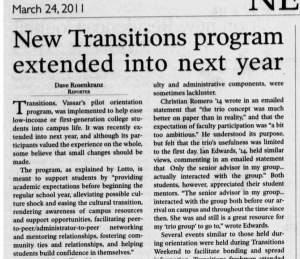Scholarship from the past 15 years explains that first-generation college students in the United States – a population that is largely female, Black African American or Latina/o, with dependent children, and from low-income backgrounds – are more likely to attend public two-year institutions, commute to school, take part-time classes while working full time, and to need remedial coursework in comparison with their peers whose parents had college degrees. These characteristics affect students’ experiences in regards to academic success, social and cultural transition, financial adjustment, and relationships with peers and faculty members, creating conditions that lead to hardship transitioning into college and put first-generation students at risk of dropping out.
At a private four year institution such as Vassar College, with more need-based financial aid and work study opportunities on campus, guaranteed housing, faculty advising and student support structures than the public two-year institutions first generation students are more likely to attend, these demographic and enrollment characteristics and experiences are quite different.
The narratives of first generation students at Vassar and similar colleges and small universities in this project take a holistic look at student’s paths to and in college, exploring
 – the influence of exposure to and lessons in privilege and privileged institutions through educational and extracurricular experiences before college;
– the influence of exposure to and lessons in privilege and privileged institutions through educational and extracurricular experiences before college;
– the kinds of parental and family involvement and encouragement they received before going to college;
– the structures and programs at their colleges that have impacted their transition;
and their sense of belonging at institutions that are often a dramatic departure from their racial, ethnic, socioeconomic, gender, and sexual (to name a few of the more salient) identities, cultures, and communities.
